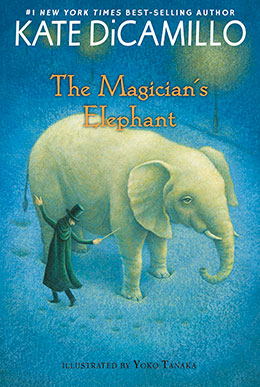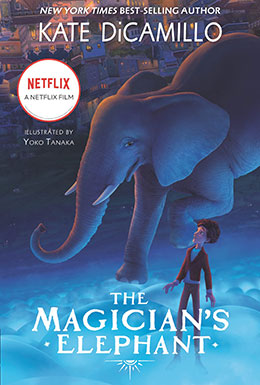
The Magician's Elephant
Candlewick Press, 2009
ISBN 978-0-76364-410-9
When a fortuneteller’s tent appears in the market square of the city of Baltese, orphan Peter Augustus Duchene knows the questions that he needs to ask: Does his sister still live? And if so, how can he find her?
The fortuneteller’s mysterious answer (an elephant! An elephant will lead him there!) sets off a chain of events so remarkable, so impossible, that you will hardly dare to believe it’s true.
With atmospheric illustrations by fine artist Yoko Tanaka, here is a dreamlike and captivating tale that could only be narrated by Newbery Medalist Kate DiCamillo. In this timeless fable, she evokes the largest of themes—hope and belonging, desire and compassion—with the lightness of a magician’s touch.
Awards and Honors
- ALSC Notable Children’s Book
- Amazon Best Books Selection
- American Booksellers Association Indies Choice Book Awards
- American Library Association Notable Children’s Recordings
- BookBrowse Awards, Best Young Adult Book
- Booklist Editors’ Choice: Books for Youth
- Borders Best Kids Books
- Borders Best May Be Yet To Come
- Chicago Public Library Best Books for Children and Teens
- Colorado Children’s Book Award
- Delaware Diamonds Booklist
- Hudson News Best Book of the Year
- Indie Next List
- Kentucky Bluegrass Award
- Maine Student Book Award
- Minnesota Book Awards
- Parents’ Choice Award
- Publishers Weekly Cuffie Award
- Washington State Scandiuzzi Children’s Book Award, Picture Books
Read the Reviews
DiCamillo’s carefully crafted prose creates an evocative aura of timelessness for a story that is, in fact, timeless. Tanaka’s acrylic artwork is meticulous in detail and aptly matches the tone of the narrative. This is a book that demands to be read aloud. (School Library Journal, starred review)
From the unexpectedly miraculous feats of a two-bit illusionist to the transformative powers of love, forgiveness, and a good mutton stew, there is much magic afoot in this fable-like tale… The profound and deeply affecting emotions at work in the story are buoyed up by the tale’s succinct, lyrical text, gentle touches of humor, and uplifting message of redemption, hope, and the interminable power of asking ‘what if?’ (Booklist, starred review)
DiCamillo’s allegorical novel seems to pack more mass per square inch than average. The plot is fantastical, surreal…And the prose is remarkable, reflecting influences from Kafka to the theater of the absurd to Laurel-and-Hardy humor. (The Horn Book)
The mannered prose and Tanaka’s delicate, darkly hued paintings give the story a somber and old-fashioned feel. The absurdist elements-street vendors peddle chunks of the now-infamous opera house ceiling with the cry “Possess the plaster of disaster!”—leaven the overall seriousness, and there is a happy if predictable ending for the eccentric cast of anguished characters, each finding something to make them whole. (Publishers Weekly)


